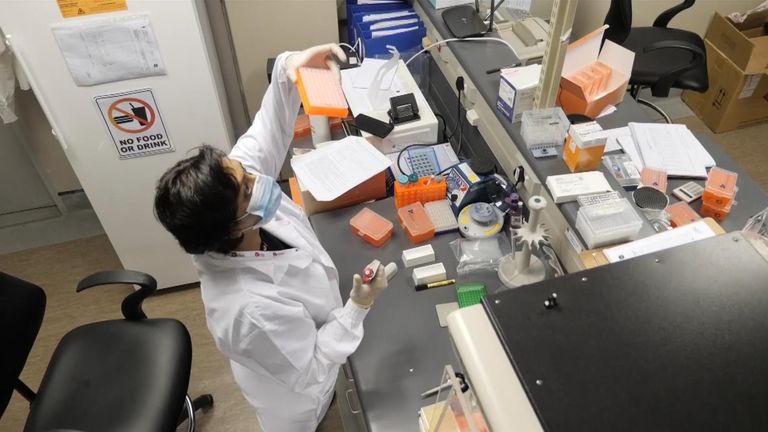Early Days on a Newly-Identified Coronavirus Variant, C.1.2., South Africa
"[The mutations on the virus] are associated with increased transmissibility [and an increased ability to evade antibodies].""It is important to highlight this lineage given its concerning constellation of mutations.""We are currently assessing the impact of this variant on antibody neutralization [in both vaccinated and unvaccinated individuals]."Research study: KwaZulu-Natal Research Innovation and Sequencing Platform, National Institute for Communicable Diseases, South Africa"It has only been detected in around 100 genomes, a very low number.""It's still a very small percentage, but again we are really keeping a good eye on that. It has all the signatures of immune escape."Tulio de Oliveira, director, Krisp (KwaZulu-Natal Research Innovation and Sequencing Platform)
 |
| Prof de Oliveira, from KRISP, says his team has seen multiple samples of viral re-infection |
The newly-identified COVID-19 mutation named C.1.2. variant was identified in the provinces of Mpumalanga and Gauteng, South Africa in May. The new mutation, by mid-August was found in six or the nine South African provinces. But it is not at this point restrained to South Africa, having appeared as well in the Democratic Republic of Congo, Mauritius, Portugal, New Zealand and Switzerland. At this early stage it has become a world traveller soon perhaps to present as a seasoned world traveller.
SARS-CoV-2 has long since demonstrated its penchant for swift re-location and the world's geography is its oyster. All viruses undergo mutations over time, and COVID-19 has proven itself to be particularly skilled in creating mutations which the world medical community consider to be of 'concern', quite apart from hundreds of others that are of little concern. It's when the virus moves efficiently into the territory of greater communicability that alarm is raised, and this one has those characteristics.
For the present, in South Africa -- and around the world -- it is an earlier variant that now has created new waves of transmission globally with new wave spasms; the worrying Delta strain first identified in India -- and in South Africa, Delta represents over 80 percent of new cases in a country where only a 14 percent immunization rate has as yet been achieved.
Once the World Health Organization classifies a variant of interest with properties of more severe transmissibility, they become a variant of concern.
In the mid-2020s during the first wave of the virus in South Africa, COVID-19 mutated into the C.1. and soon dominated as a more contagious virus from its original lineage; C.1. mutated further to become C.l.2., evolving to its present form, passing through between 44 and 59 mutations from the Wuhan original virus.
Back in May the new variant was recognized as accounting for 0.2 percent of the genomes sequenced in South Africa, which rose to 1.5 percent in June, and a month later rose to 2 percent. The current research undertaken to assess the variant's impact on antibody effectiveness is expected in a week, according to Dr. de Oliveira.
Still, the scientists have no wish for South Africa to be credited as the crucible where these variants originated; having stressed that despite the country's advanced ability to sequence the genomes of the virus to enable identifying new strains, they might conceivably have arisen elsewhere in the world and migrated to South Africa.
Detection and frequency of the c.1.2 mutated sars-cov-2 lineage in South Africa"Based on our understanding of the mutations in this lineage partial immune escape may be possible, but despite this, vaccines will still offer high levels of protection against hospitalization and death.""We expect new variants to continue to emerge wherever the virus is spreading. Vaccination remains critical to protect those in our communities at high risk of hospitalization and death, to reduce strain on the health system, and to help slow transmission. This has to be combined with all the other public health and social measures, so we advise the public to remain vigilant and continue to follow COVID-19 protocol by: ensuring good ventilation in all shared spaces, wearing masks (which cover your nose, mouth and chin), washing or sanitizing your hands and surfaces regularly, and keeping 1.5m distance from others as much as possible. These non-pharmaceutical interventions are still proven to prevent the spread of all SARS-CoV-2 viruses."
 |
| Yahoo, New York Daily News |
Labels: C.1.2. Transmissibility, New COVID Variant, Research, South Africa

0 Comments:
Post a Comment
<< Home